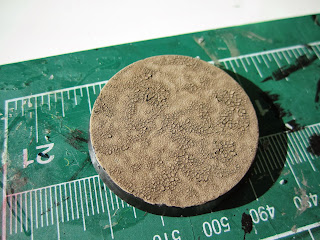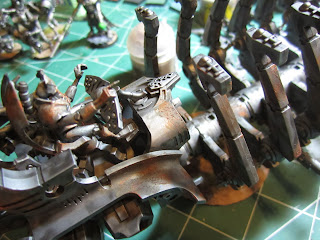The New Citadel
Technical Paints
Recently, Citadel released 6 new Technical paints. They have various applications and uses
individually and in conjunction with each other. We are going to take a look at the 4 paints
that I have picked up since their release.
We will talk about what each paint does and how to use it. First, a brief overview of each paint.
Agrellan Earth - This is a medium brown crackle effect
paint. When applied thickly and let to
dry, the paint will shrink and give a crackle effect.
Typhus Corrosion - This is a dark brown wash paint with
small particles mixed in to give it some texture. Can be thinned and applied like a normal
wash.
Ryza Rust - This is a dry compound that is used to give a
rust effect. Used with Typhus Corrosion
it gives very quick and nice rust looks.
Blood for the Blood God - This is a glossy dark red
wash. It is used to simulate the effect
of wet blood.
Nurgle's Rot - This is a glossy green paint that can be
quite transparent when applied, like a wash.
It gives the effect of wet, slimy, pestilence effect.
Nihilakh Oxide - This is a wash used to give the effect of
weathered bronze and brass.
The first of these technical paints that I saw and wanted to
try out was the Agrellan Earth. This is
so far my favorite paint out of the new technical paints, in fact I'm using it
to base my Necrons instead of standard "sand and gravel"
mixtures. To use this paint, you're
going to need to apply it much thicker than you normally would. You may be thinking that this is a waste, but
the thicker the paint the larger the cracks will be. If you have a thin layer you will get fine
hairline cracks that are barely noticeable, but can add a lot of detail to the
base. I recommend varying the thickness
of the paint on the base as you apply it to have some high and low areas, this
will give a more natural crackle effect when it dries. It is recommended by Games Workshop that you
let it dry for at least a hour, which is great if you have something else to
work on or it's the last thing you're doing for the night. I found that using a heat source like a hair
dryer on "Low" gives it just enough heat to speed the drying process
up to 1-2 minutes, and allows for the crackle effect to be seen as it
dries! Once the Agrellan Earth paint has
cracked you will be able to see the color beneath it, so it is highly
recommended that you paint your bases a darker color first! I like the look of black or a dark brown
under them as it gives good contrast. To
finish it off I added tufts from Games Workshop Midland Tufts which gave a good
natural contrast and compliment to the crackle effect. I have also had some success in using my
airbrush over the crackle effect to give it a different color. I tried to mix in the paint colors to
Agrellan Earth and it thins out too much to achieve the crackle effect. Using greys can get you a moonscape effect,
and reds/oxides will get your a mars landscape effect.
Now, Agrellan Earth did have a bad batch run in the UK, so
if you are not achieving the desired results, try a thicker layer of paint
first. If this still isn't working for
you, check with your local GW store and see if they are doing a replacement
offer for the paint.
The next two paints work as a pair to give a great effect to
vehicles and metal pieces. Typhus
Corrosion and Ryza Rust are the two you're looking for. Typhus Corrosion is to be applied like you
would a normal wash, allowing the grittiness of the paint to build up in areas
where dirt and dust would normally collect over time. As this is drying you can use a paper towel,
cloth, or even your finger to blend the wash into the paint so you don't get
the stark contrast that normally happens when you don't blend. This paint actually dries very quickly for the
consistency it has in the bottle, so you don't have to wait too long before you
can go to the next part of the effect, Ryza Rust. Ryza Rust is a bright orange dry compound
that is used to simulate the effects of metal rusting. Using a drybrush, get a little bit of the
paint onto it and wipe it around on your towel to get most of it off. There should be a very light layer of paint
left on the brush. Brush in the
direction that water would flow on the model and rust would form, I usually do
a downward direction. This is a paint
where less is more to get the effect.
The last one that I have gotten is Blood for the Blood
God. This is a wet looking blood effect
paint that can be applied in two ways.
The first is by brushing it onto the areas in which you want to have a
blood effect, such as Ork teeth or weapons.
For the use on weapons such as cleavers and swords, determine where the
cut occurred and blood would start flowing from, this is where you're going to
pull the paint away from so it looks like it streaked down/further onto the
weapon. Slowly build the paint up at the
edge to give it a bit more gory look at the point of contact. The second way to apply this paint is to get
a splatter effect by "flicking" the paint onto the model. To do this you will need a stippling
brush. This is a brush with very short
stiff hairs. Here's where it gets really
messy. You get some of the paint onto
your stipple brush and hold it like you're giving a thumbs up to someone. Using your thumb pull back on the bristles
and let them flick the paint onto your desired location. This will end up with paint going everywhere,
so make sure you do it in a location that won't result in you getting into
trouble.
Each of these paints will take some experimentation to get
the effect that you desire out of them, but with practice and patience you will
have great results for very little work.
I highly recommend that you pick them up if you are looking for a quick
way to achieve any of these effects. I
will be continuing to experiment with them and enjoy their abilities.




















